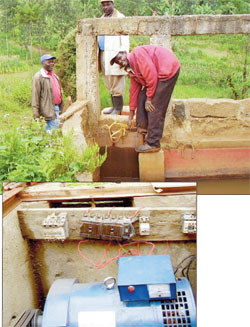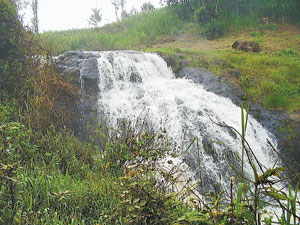By Amos Kareithi and Boniface Gikandi
The roaring water cascading down the river and raising a misty spray is a spectacle to behold.
Villagers of Ireke Village, in Mathioya, Murang’a District appear not to notice nature’s spectacle of a surging confluence which has been part of their environment for ages.
However, their decades of nonchalance came to an end six years ago when a delegation of farmers from Kiambu visited a nearby coffee factory.
The visitors seemed captivated by the bewitching beauty of the waterfalls and wanted to know if locals had ever used the rare resource to better their lives, says retired teacher, Joseph Kinyua Kiragu.
What started as an innocent question provoked the residents to dream of ways to harness the waters of River Godo to more use than just irrigating vegetable farms..
Another resident, Kimathi Kiruhi, recalls the visitors told them the waterfalls could be a source of electricity which the villagers had never dreamt of.
 |
Locals show how they trap water inset. [PHOTO: AMOS KAREITHI/STANDARD]
|
The villagers were advised to call in a hydro-electric engineer to advise them on how to build a micro power generation plant using the river water.
When the idea of harnessing the waters of Godo River was floated, Kiruhi was among the first residents who turned up at Kahinduini to listen to engineer Peter Muchoki explain a plan to tap. Registered villagers raised funds through a local welfare association and bought wood planks to direct water from several tributaries to follow one course.
The water was directed down a steep incline where it rotated a turbine that would feed power to a generator.
To prove that River Godo could indeed produce power, a small generator capable of producing 12KVA was purchased for Sh38,000 in 2005.
"The generator produced electricity which was connected to Ireke Tea buying centre. When bulbs flickered to light, doubting Thomases finally believed there was light at the end of the tunnel," Kiruhi says.
First obstacle
As more villagers stampeded to be registered, the project encountered its first obstacle after word spread that they were illegally producing their own electricity.
Senior Government officers trooped to the area to inspect the project. An electricity generating company was unhappy over the ‘infringement’ into their territory.
The villagers were allowed to continue tapping the power as long it was a self-help project and not a business venture. They project is not allowed to install metres — consumers pay a standing Sh100 monthly fee — since only KPLC is allowed to do so.
Kahinduini Micro Hydropower project has since triumphed over its teething problems and connected power to 50 consumers in a radius of four square kilometres.
Water intake
Five strands of high voltage wires snake out of the power house onto a pole standing next to the intake where a poster warns visitors of lurking danger.
A pair of wires snake to Kenya Njeru and the larger Rwathia while the other two are networked in Kahinduini village in Njumbi.
About seventy meters from the source, Lucy Wangui, a mother of three is busy in her timber house.
She says, "I never thought I could afford electricity in my house. Look at this compound, do you think we could ever raise money needed for the Kenya Power and Lighting Company (KPLC) connection?"
Encouraged by the success of the first phase, the residents have purchased a bigger generator worth Sh800,000, capable of a 150 KVA output. |
| River Godo on which villagers in Mathioya, Murang’a District, have put up a micro hydro-electric power project. |
"This power is enough to supply all the 1,020 residents who have registered with us. We have also bought a turbine and we are in the process of installing a bigger plant," Kiruhi says.
To be connected to the Kahinduini power grid, a resident must pay Sh14,000 which caters for the cost of wiring the house.
"This is not a lot of money, considering there are no metres and no monthly bills. We pay a standing charge of Sh100 to finance greasing of the turbines and replacing of poles," Wangui says.
Since she was connected to the village power line, Wangui says she rarely buys kerosene as she used to.
"I am confident that once the project is expanded, I will not only use an electric cooker but also our village paths will have street Lights.
There is a team of technicians who do maintenance and disconnect those who do not pay the monthly fees.
Disconnection
"If a consumer does not pay Sh100 as required every month, I just climb up the pole next to the house and disconnect the cable. We do not have meters and so this is the easiest method," Peter Mwangi who is in-charge of maintenance says.
Under the current legal framework, Kahinuini cannot install meters and charge because KPLC is the only institution mandated by law to do so.
 The Standard Group Plc is a multi-media organization with investments in media
platforms spanning newspaper print operations, television, radio broadcasting,
digital and online services. The Standard Group is recognized as a leading
multi-media house in Kenya with a key influence in matters of national and
international interest.
The Standard Group Plc is a multi-media organization with investments in media
platforms spanning newspaper print operations, television, radio broadcasting,
digital and online services. The Standard Group is recognized as a leading
multi-media house in Kenya with a key influence in matters of national and
international interest.
 The Standard Group Plc is a multi-media organization with investments in media
platforms spanning newspaper print operations, television, radio broadcasting,
digital and online services. The Standard Group is recognized as a leading
multi-media house in Kenya with a key influence in matters of national and
international interest.
The Standard Group Plc is a multi-media organization with investments in media
platforms spanning newspaper print operations, television, radio broadcasting,
digital and online services. The Standard Group is recognized as a leading
multi-media house in Kenya with a key influence in matters of national and
international interest.











